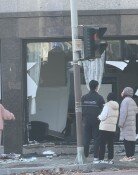Presidential Commission on Judicial Reform Failed to Forge Consensus on Major Issues
Presidential Commission on Judicial Reform Failed to Forge Consensus on Major Issues
Posted May. 05, 2005 23:41,
The Presidential Commission on Judicial Reform (co-chaired by Prime Minister Lee Hae-chan and Attorney Han Seung-hun) decided on May 5 to draw up three proposals, not one single proposal, over whether to use sound or video recordings of a defendant`s confession as evidence. The commission is planning to submit the three proposals to a working subcommittee on May 9. The using of sound or video recordings is one of the major issues between the commission and the prosecution.
Han, co-chair of the commission, said, We decided to come up with plural proposals since both opinions from the prosecution and the commission make sense. The commission is expected to choose a final proposal by a majority vote, if necessary, in case the working subcommittee fails to reach an agreement on one of the three.
However, it is possible that the Ministry of Justice, the prosecution, and the commission might lapse into conflict depending on the situation. The Justice Ministry and the prosecution forcefully demand recognizing sound or video recordings as evidence as a complementary measure, in case prosecutors interrogations are not accepted as evidence under a revised criminal procedure law.
The three proposals are: sound or video recordings shall not used as evidence in case defendants are in denial (the commissions draft); such recordings shall be viewed as evidence only when disputes over defendant confessions at an investigation agency are hard to resolve otherwise (the commissions revision); and such recordings shall be recognized as evidence when they prove reliable through testimony of investigators (the prosecutions proposal).
The presidential commission said the prosecutors questioning of defendants in court will be retained on the prosecutions request, but that the timing of questioning will be after the taking of evidence.
Furthermore, it announced that defendant interrogations prepared by the prosecutor would not be recognized as evidence in court as it proposed, but that the prosecutor would be able to testify to the content of investigation in court. Also, investigation officers of the prosecution and Judicial police officers, other than the prosecutor will be allowed to testify with investigation content.
Concerning witness interrogations, the commissions draft reconfirmed that such interrogations will not be recognized as evidence and the prosecutor will not be allowed to testify in court, in case the defendant is in denial.
jin0619@donga.com




![[김순덕의 도발] ‘李부터 연임’ 개헌, 이 대통령은 가능성을 말했다](https://dimg.donga.com/c/138/175/90/1/wps/NEWS/IMAGE/2026/01/16/133172656.1.jpg)


